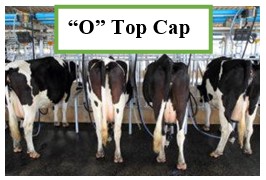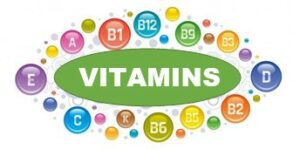Vitamins
Vitamins are very tiny organic molecules, but play a huge role in livestock’s normal body functions. Vitamin A comes from beta-carotene, a pigment in green plants that animals convert into vitamin A. Cows need 30,000 to 50,000 IU of vitamin A per head per day. Vitamin D is formed from exposure to sunlight or other ultraviolet light rays that animals convert into vitamin D through their skin. Cows need 20,000 IU of vitamin D per head per day. Vitamin E is a fat-soluble vitamin found in fresh, green, leafy forages and whole grains. Cows need 300 to 500 IU of vitamin E per head per day. Vitamin B is a water-soluble vitamin that is synthesized by rumen microbes to meet the animal’s requirements. All these vitamins play a key role within the animal’s body.
Vitamin A helps maintain healthy epithelial tissues including eyes, skin, and the lining of the respiratory, digestive, and reproductive tracts. It’s also essential for proper functioning of the kidneys, and normal development of bones, teeth, and nerve tissue.
Vitamin D is critical to the health of bones and the digestive tract. Vitamin D increases the absorption from the digestive tract and metabolic use of calcium and phosphorus. Also helps regulate blood calcium levels and the conversion of inorganic to organic phosphorus.
Vitamin E helps maintain immune function and animal health. Vitamin E aids in the prevention of muscular dystrophy. It is also involved with the control of nerves, muscles, and senses. Contractions of muscles allowing movement, heartbeat, rumen, and lung function are all influenced by Vitamin E as well as excretion of manure. Feed conversion efficiency, growth, and reproduction are also affected by Vitamin E.
Vitamin B has many different compounds that often coexist in the same foods and/or dietary supplements referred as a vitamin B complex.
Vitamin B complex consists of eight B vitamin compounds that all have different jobs in the body. The vitamin B complex consists of B1 (thiamine), B2 (riboflavin), B3 (niacin), B5 (pantothenic acid), B6 (pyridoxine), B7 (biotin), B9 (folic acid), and B12 (cobalamin). B-1 (thiamine) is important for providing energy to the brain, and improve transmission of nerve impulses through the nerves by providing them with energy. Also, it aids in proper function of the heart muscles, healthy mucus membrane, maintenance of smooth and skeletal muscles, and the formation of red blood cells. B2 (riboflavin) is important for body growth. It helps in red blood cell production. It also aids in the release of energy from proteins. B3 (niacin) improves digestive health, increase the fertility, and may increase milk yield in the early stages of lactation. B5 (pantothenic acid) synthesizes coenzyme-A (CoA) as well as to synthesize and metabolize proteins, carbohydrates, and fats to turn them into energy. B6 (pyridoxine) is essential for red blood cell metabolism ad hemoglobin formation. It is also needed to have the nervous and immune system function efficiently. B7 (biotin) produces keratin, the protein which makes up hair, hooves, and horns. B9 (folic acid) acts as a coenzyme for leucopoiesis (production of white blood cells), erythropoiesis (production of red blood cells) and nucleoprotein synthesis (DNA and RNA). B12 (cobalamin) is vital for glucose production, which is essential to meet the high energy demands of growth and lactation.
Signs of Deficiency
Vitamins are so important role in the body’s normal function that deficiencies can be very severe. Signs that an animal is deficient in vitamin A will be night blindness, poor growth, poor hair coats, and suppressed immunity. In adult cattle, Vitamin A deficiency is associated with retained placentas and impaired fertility. Signs of vitamin D deficiencies include rickets – soft, porous, poorly developed bones. Calves deficient in vitamin D have poor appetite, decreased growth, stiff gait, weakness and labored breathing. Later signs include swollen joints, slight arching of back, bowed legs and bent knees. Bones that are easily broken is a sign of vitamin deficiency at all ages. Vitamin E deficiency signs include retained placenta, abnormal calving, calving to stillbirths or weak calves, and cattle are more susceptible to metritis and cystic ovaries. Signs of deficiencies in calves are stiffness and inability to stand, respiratory distress and sudden death without previous illness.
Deficiencies in the B vitamins may include:
- B1: loss of appetite, muscular weakness, severe nervous disorders, general weakness
- B2: digestive disturbances, general weakness, eye abnormalities and reproductive impairment
- B5: there is scaly dermatitis around the eyes and muzzle
- B6: demyelination of peripheral nerves and hemorrhages in the epicardium are noticed
- B7: hindquarter paralysis
- B9: diarrhea, pneumonia, and persosis or slipped tendon
- B12: Pernicious Anemia is a type of megaloblastic anemia characterized by decreased number of enlarged red blood Also can cause causes demyelination and irreversible nerve cell death.

“O” Top Cap supplies daily vitamins needs, that are very important to the animals health and normal body functions. “O” Top Cap is a concentrated trace mineral and vitamin blend with sulfate forms of essential trace minerals. It contains high levels of vitamin A, D and E, and provides a complete B vitamin package, including niacin and choline. Lactating rations for high producing cows when dairyman desires to purchase commodity calcium and phosphorus sources in addition. Works well in grain mixes, TMR mixes and mineral mixes. Utilized at Midwestern BioAg plant to make custom blend minerals. Suitable for certified organic dairy production.


